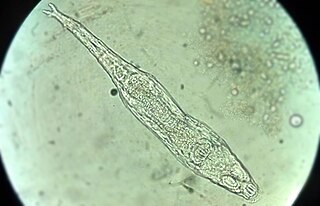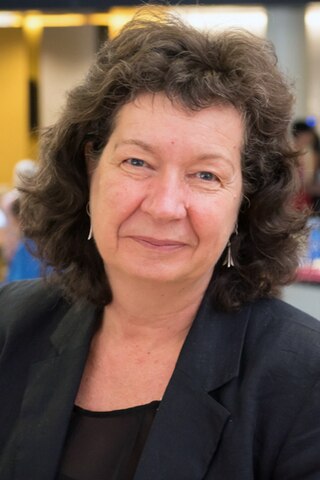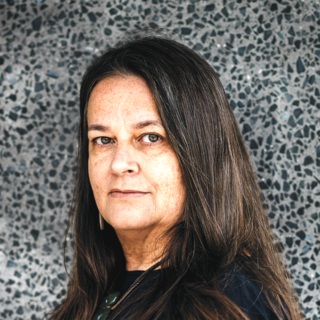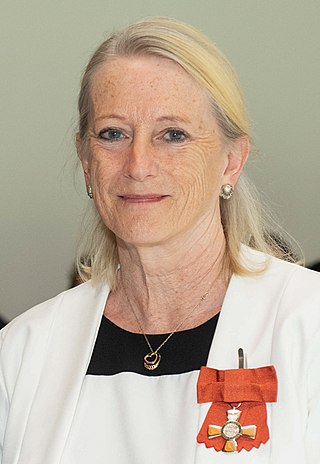
The Royal Society Te Apārangi is a not-for-profit body in New Zealand providing funding and policy advice in the fields of sciences and the humanities. These fundings are provided on behalf of the New Zealand Ministry of Business, Innovation and Employment.
Elsa Beatrice Kidson was a New Zealand soil scientist and sculptor.

Soil mesofauna are invertebrates between 0.1mm and 2mm in size, which live in the soil or in a leaf litter layer on the soil surface. Members of this group include nematodes, mites, springtails (collembola), proturans, pauropods, rotifers, earthworms, tardigrades, small spiders, pseudoscorpions, opiliones (harvestmen), enchytraeidae such as potworms, insect larvae, small isopods and myriapods. They play an important part in the carbon cycle and are likely to be adversely affected by climate change.

Jacqueline Sara Rowarth is a New Zealand and British agronomist, dairy farmer and science administrator.

Victoria Metcalf is an Antarctic researcher based in New Zealand, best known for her work on Antarctic fishes and invertebrates. She was awarded the 2006 Zonta Science Award.

Wendy Larner is a New Zealand social scientist who has focussed on the interdisciplinary areas of globalisation, governance and gender. She has been Vice-Chancellor and President of Cardiff University since September 2023, having previously been provost at Victoria University, Wellington, New Zealand.
Kevin Russel Tate was a New Zealand soil chemist, ecologist and climate scientist.

Helen Moewaka Barnes is a New Zealand academic. She is Māori, of Te Kapotai (Ngāpuhi) and Ngapuhi-nui-tonu descent, and is currently a full professor at Massey University. In 2021 she was elected as a Fellow of the Royal Society Te Apārangi.
Jennifer Bohun Hay is a New Zealand linguist who specialises in sociolinguistics, laboratory phonology, and the history of New Zealand English. As of 2020 she is a full professor at the University of Canterbury.

Joyce WatsonFNZIC was a New Zealand chemist specialising in fruit disorders and trace elements.

Caroline Mary Saunders is a New Zealand academic, and as of 2020 is a Distinguished Professor at Lincoln University, specialising in environmental economics. She is a Fellow of the Royal Society Te Apārangi.
Anne Briar Smith was a New Zealand professor at the University of Otago, and was a pioneering children's rights researcher.
Susan Elizabeth Gardiner is a New Zealand horticultural scientist, who works on using genetics and genomics for fruit breeding. Gardiner has received multiple awards. Gardiner has been a Fellow of the Royal Society Te Apārangi since 2020 and is a Fellow of the International Society for Horticultural Science. She is an Honorary Fellow of Plant & Food Research.
The Rutherford Discovery Fellowships are an annual science fellowship in New Zealand. The fellowships, established in 2010, are administered by the Royal Society Te Apārangi through a competitive process. Ten fellowships are awarded nationally. The successful Fellows are announced in October/November each year. The awards made in 2023, to twelve recipients, were the final awards.

Patricia M. Fraser is a New Zealand soil scientist at Crown Research Institute Plant & Food Research in Lincoln. Her work focuses on the role of earthworms in the soil, and nitrate leaching, to further understand soil quality in cropping systems. She won a 2020 New Zealand Woman of Influence Award in the Rural category.

SallyAnn Harbison is a New Zealand forensic scientist. She leads the forensic biology team at the Institute of Environmental Science and Research, and is an associate professor at the University of Auckland. Harbison was appointed a Member of the New Zealand Order of Merit in 2021 and in the same year was elected as a Fellow of the Royal Society Te Apārangi.

Amanda Black is a New Zealand soil chemist who as of 2023 is a full professor at Lincoln University, specialising in soil health and biosecurity. She has worked on kauri dieback and integration of matauranga Māori into science.

Lisa Anne Te Morenga is a New Zealand Maori academic, and she is a full professor at the Research Centre for Hauora and Health at Massey University. Her research focuses on nutrition and Māori health, especially in relation to dietary interventions to prevent metabolic disease.
Karen Fisher is a New Zealand human geographer, and is a full professor at the University of Auckland, specialising in freshwater and marine socio-ecological systems.
Barbara June Hayden is a New Zealand marine biologist, and is Chief Scientist at the National Institute of Water and Atmospheric Research (NIWA), specialising in marine biosecurity and aquaculture. In 2019 she was elected a Companion of the Royal Society Te Apārangi and awarded the New Zealand Marine Sciences Society Award.











